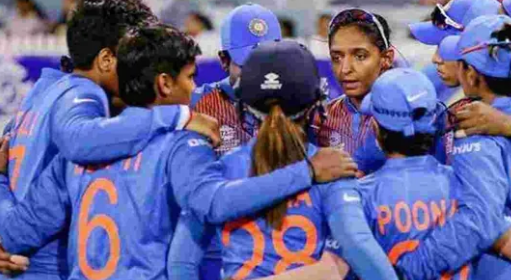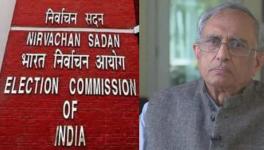‘There’s Still Time To Fix This’ But Does the BCCI Care to Identify the Faults?

What’s more damning is the fact that the Indian women’s team cricketers are without BCCI central contracts since last September (Pic: Twitter, HT).
“There is still time to fix this,” read former Australia cricketer Lisa Sthalekar’s tweet, along with the now viral note attached as a picture file. The note is the mythical mirror of conscience for the Board of Control for Cricket in India (BCCI) to reflect on, and asks the sport’s richest body to be a little more caring towards its players, especially the women. Sthalekar’s tweet is talking specifically about Veda Krishnamurthy, who was dropped from the Indian team set to tour England. The Australian, a member of the ICC Hall of Fame, and a global ambassador of the women’s game, feels the Board should have reached out to Veda, who lost her mother and sister in the devastating second wave of the Covid-19 pandemic recently. The Board, lest we have forgotten, was busy at the time setting up bubbles for the Indian Premier League (IPL).
There is still time to fix this…
Fix what, though. Where to start even? To fix the treatment of players, especially women cricketers in the lower rungs of the game, the overhaul has to happen in the Indian cricket board itself. A thorough dismantling and reassembling, one that rids the Board of its current all-consuming set of priorities — money, monopoly and men.
Sthalekar, perhaps, doesn’t realise the extent of the rot within Indian cricket, highlighted recently by the Board’s insistence to continue with the IPL “entertainment”, even as the second wave of Covid-19 swept through the country, with people dying due to lack of basic medical intervention, even in cities where the matches were being staged.
The BCCI did eventually cancel the IPL, but only after the coronavirus breached its biosecure bubble and burst its misplaced sense of superiority. The rich Board cannot be bothered by problems — be it life or death — the commoners have to deal with. The image of BCCI has taken a beating with its brash and selfish stance during the pandemic. Or has it?
Read More | BCCI and Its Perennial Habit of Ignoring the Women’s Game
The status of the game in India is glossed over by the riches and fireworks provided by the men and the IPL. All stakeholders and voices in the game — from cricket associations including Sthalekar’s Cricket Australia to former players and cricketing aristocrats of the MCC — act as devoted bards to the religious fervour the game commands in the subcontinent. All thank India, so much so that, like worshippers in a cult, they see nothing wrong, hear nothing wrong, and certainly speak nothing wrong.
That is exactly why Sthalekar’s tweet and her voice stands out. Because of its singularity. It stands out because it's rare in the cricketing fraternity. In fact, in the Twitter thread, many, including Indians have lamented that nobody, not even celebrated former players, cricket pundits or thinkers, dare to call out BCCI’s lack of empathy in general, and its well-documented misogyny and apathy towards the women’s game.
Those who do speak, soften it a little with a beautiful spin. The notion that in the last decade or so, big strides have been made in the women’s game in India. The women got central contracts in 2018, for instance. What needs to be highlighted is the frame of reference by which the “big strides” need to be measured and understood. We are talking about progress from nought. From nothingness!
Yes, before 2018 there were no central contracts for the women’s team. The teams — even for the World Cup — were arbitrarily picked and allowances given one tournament at a time. The coaches were axed or hired based on whims and fancies of the power centres in the set-up (a few stars as well and Board bosses). If at all the contracts that came in 2018 ring in some positive changes, it is being undone by the current blokes at the helm of the BCCI.
For instance, WV Raman, who was the coach of the women’s team till a couple of days back, is alleging a “smear campaign” after he got sacked. Raman has written a letter to BCCI president Sourav Ganguly — copied to Rahul Dravid — pouring his heart out over the unjust treatment. It is deja vu of sorts for the women’s team though. Such axings have been the norm.
What’s more damning is the fact that the women are without central contracts since last September. Yes, the squad for the England tour has been announced but the players are without contracts. Of course, in the coming weeks, the BCCI (secretary Jay Shah’s office directly handles player contracts), might draw up documents for the players to sign.
Also Read | Naomi Osaka, Kei Nishikori Express Doubts on Safe Conduct of Tokyo Games
That would, however, be something on the lines of the system that was in place till 2017, wouldn’t it? The business of ad hoc allowances and appointments, allegedly, with vested interests.
One has to forgive Sthalekar for thinking that Veda was a contracted player and hence the BCCI was at least obliged, contractually, to reach out to her in her hour of distress. She is used to such organised structure Down Under, you see. Unfortunately, as of now, Veda is, in sports business parlance, a free agent with zero liability to the company.
What is happening, or rather not happening, in the women’s game is pulling it back to the dark ages. In Indian women’s cricket, the dark ages are not ancient. Not the least. One has to go back a decade or so that’s it. Late 2000s maybe. That’s when the women’s side last had a year’s gap between international assignments — March 2007 to May 2009 — a gap of 420 days to be exact. We almost saw a repeat recently. The women were on ice for 364 days (between the T20 World Cup final on March 8, 2020, and the match against South Africa on March 7, 2021). And we are talking about elite cricketers of the country with no opportunity to play. One can’t even imagine the plight of the players in the domestic rungs of the game. Saying the situation is bleak would be a gross understatement here.
Now we all know what the men were accorded with in the same period. After the initial lockdown phase, and once the sport got used to the new norms and protocols, Virat Kohli and co. played many series, including a trip to Australia, and the IPL twice (well, technically, one-and-a-half times). By mid April, they also saw their central contracts renewed.
It is by design, and not by chance, that Indian cricket is driven by misogynistic priorities. Sthalekar’s statement has merely scratched the surface. And to cleanse Indian cricket of all its ills, plus the almost zero goodwill it has now thanks to an IPL show amidst death and pain, the voices should rise from within. An impossible task for all our superstars, demigods, and gods of the game. For they all sit pretty on pedestals built by endowments coming from the BCCI coffers.
Sthalekar is right. There is still time to fix this. Time unfortunately in our current world is a function of economics. And the economic variables of the game dictate the Board is always right, regardless of what its actions reveal.
Get the latest reports & analysis with people's perspective on Protests, movements & deep analytical videos, discussions of the current affairs in your Telegram app. Subscribe to NewsClick's Telegram channel & get Real-Time updates on stories, as they get published on our website.
























